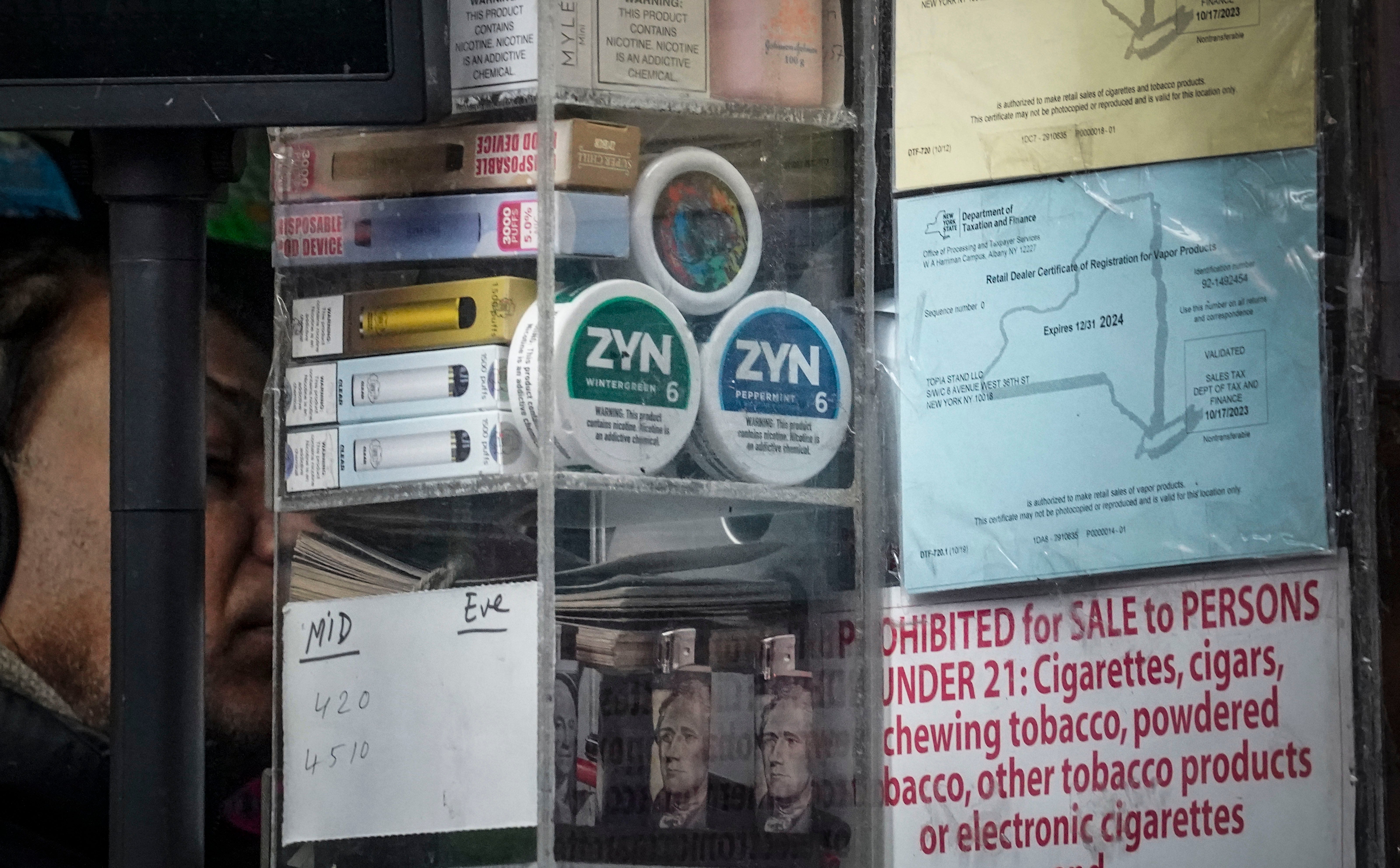Zyn is the new nicotine craze all over TikTok – parents and politicians are worried
‘Zynnies’ have appeared on social media with many fearing for users’ health

A new trend has appeared on social media and with it fear from politicians and parents alike.
Zyn is latest tobacco product trending online: a tiny pouch filled with nicotine and flavoring.
Zyn comes in flavors like mint, coffee and citrus, and Philip Morris International markets it to adult tobacco users. But videos of young people popping the pouches have racked up millions of views on TikTok and other social media platforms.
Users have quickly developed their own online vocabulary, including “zynnies,” “zynner” and “zynsky.”
That trend has advocates worried that Zyn could become the latest nicotine product to attract underage teens, similar to the way Juul triggered a yearslong spike in vaping. Other experts say that risk is outweighed by the potential to steer adults away from cigarettes and other traditional tobacco products, which account for 480,000 US deaths annually.
“The definition of insanity is doing the same thing and expecting a different result,” said Dr. Jasjit Ahluwalia, an addiction specialist at Brown University. “That is what we’ve done with tobacco for decades. We’ve been all about abstinence, instead of embracing products that can reduce harm.”
Ahluwalia sees nicotine pouches and e-cigarettes as a way to help smokers cut back or quit cigarettes.
That approach is standard practice in the UK, but it’s outside the medical mainstream in the US, where only pharmaceutical-grade medications like nicotine gum and lozenges are formally approved to help smokers quit.
Ahluwalia points out that Zyn works the same way as those products: releasing low levels of nicotine that are absorbed into the gums, reducing cravings. The chief difference, he notes, is that Zyn is sold by Philip Morris, the global cigarette giant and a longtime foe of anti-smoking groups.
The controversy around Zyn recently spilled over into politics, pitting Democrats and Republicans in Washington against each other and spiraling into another skirmish in the nation's culture war.
In late January, Democratic Sen. Charles Schumer, of New York, called on regulators to investigate Zyn, citing its appeal to teens. Several House Republicans then warned constituents that “Big Brother” intended to “ban nicotine.”
Conservative pundit Tucker Carlson, a Zyn user, jumped into the fray, declaring: “Zyn is not a sin,” and touting its unproven benefits, like “enhancing male vitality and mental acuity.”
“There’s this online subculture around Zyn that’s been spearheaded by younger males, but a lot of that’s not coming from the brand itself,” said Ollie Ganz, a Rutgers University tobacco and nicotine researcher.
Online videos show young people documenting their first experiences trying Zyn, reviewing different flavor combinations and displaying heaping piles of used canisters.
“It’s concerning to see the countless Zyn-related memes and hashtags that are being amplified and normalized across social media,” said Kathy Crosby, CEO of the Truth Initiative, an anti-tobacco advocacy group.
Truth and other groups point to research suggesting nicotine can interfere with brain development in adolescents.
It’s the Food and Drug Administration’s job to weigh Zyn’s risks to youngsters against its potential to help adults.
In a statement, an FDA spokesman said the agency is monitoring underage use, noting that 1.5% of high school and middle schoolers reported using pouches last year. That’s well below the 10% who used e-cigarettes.
FDA officials have allowed Zyn to stay on the market while they review Philip Morris’ marketing application, which has been pending since 2020. If teen use remains low, the company could win FDA authorization for at least some of its offerings, which come in multiple strengths and a dozen flavors.
In 2019, the FDA awarded its first-ever reduced risk designation to a similar product: snus, a tobacco pouch popular in Sweden that contains lower levels of carcinogens than cigarettes. The FDA said smokers who switch to snus reduce their risk of lung cancer, bronchitis and other diseases.
Zyn excludes the tobacco leaves found in snus, leaving only nicotine, which Philip Morris says increases its appeal.
“People can be reluctant to move into an oral tobacco product if they view it as similar to traditional chewing tobacco,” company spokesman Corey Henry said. “Consumer acceptability is a big part of Zyn.”
Philip Morris doesn’t use online influencers or endorsements to promote Zyn, Henry said. Its website is restricted to adults 21 and older. And flavors like cinnamon and peppermint are “familiar to adults,” Henry said.
Zyn launched in the US in 2014, but sales have exploded in the past year, generating $1.8 billion as shipments accelerated year-over-year by over 60%.
On a November call with retailers, one company executive called the growth “gonzo” and “lights out.”
“I didn’t see this coming. I don’t know anyone who did,” said Joseph Teller, a director for oral tobacco products.
Zyn promotions emphasize the pouches' discreet, convenient nature as a “smoke-free,” “spit-free” alternative for smokers “at work” or “on the move.”
But to fulfill the company’s stated goal of a “smoke-free future,” Zyn will need to help users fully switch from cigarettes, rather than alternating between the two.
There’s little data on switching, and preliminary research suggests pouches may not be a great substitute.
Ohio State University researchers recently found it took smokers 30 minutes to an hour to get enough nicotine from Zyn to relieve their cravings. With cigarettes, smokers achieved the same nicotine levels — and relief — in five minutes.
For now, smokers who have had success with Zyn say they hope it stays available.
Subscribe to Independent Premium to bookmark this article
Want to bookmark your favourite articles and stories to read or reference later? Start your Independent Premium subscription today.
